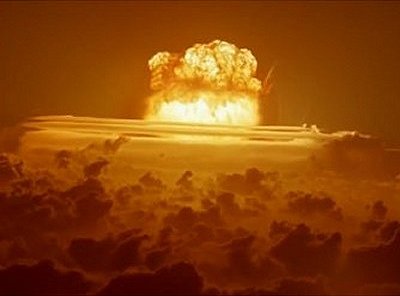
THE WORST NIGHTMARE
Several safety experts suggest it is a question of when rather than if a nuclear weapon is detonated, whether by accident or design. Theirs is a call to action, not an appeal to fatalism.
At 2.30am on June 3, 1980, US National Security Adviser, Zbigniew Brzezinski was woken from sleep to be told that Soviet submarines had launched 220 nuclear missiles at the United States. He asked for confirmation and it came: almost every long range missile from the Soviet arsenal was minutes away from the US. It was, of course, a false alarm, but Brzezinski didn’t know that for several more minutes. He chose not to wake his wife, preferring she be unconscious when the end came. It is unlikely he returned easily to sleep.
This is merely one vignette from the extraordinary Command and Control (Penguin 2014) by distinguished American journalist Eric Schlosser, a necessary reflection on the nuclear age when all popular attention is fixed on the threat of homeland terrorism. It is also a reminder to those old enough to remember that the Cold War threatened complete annihilation at many points and not just by the deliberate launch of missiles; serious risks were posed by the accidental detonation of nuclear weapons too.
Just days after John F Kennedy’s inauguration as President in January 1961, a hydrogen bomb accidentally dropped to the ground in North Carolina when a B-52 bomber caught fire; every safety mechanism failed bar one. This was a switch as simple as one we use to turn on lights. If it had been in the wrong position, a thermonuclear weapon would have destroyed much of the State and deposited lethal fall-out over Washington, New York, Philadelphia and Baltimore. The alarming build up of nuclear weapons in the USA and USSR over the decades increased the likelihood of tragedy simply by expanding the risk of something going wrong.
It is perplexing and unsettling to look back and recall the serious arguments made by many politicians, service personnel, academics and civilians for a winnable nuclear war and the use of tactical nuclear weapons in the field. The USA itself had a strategy in place called the Single Integrated Operational Plan (SIOP) which inflexibly called for the launch of as many missiles of possible at the USSR if it came under a nuclear attack of any dimension. The sheer scale of devastation unleashed by such a war would have put the world back to a pre-human era and poisoned the planet irretrievably; the physical and emotional cost would have been inconceivable. Were people really that mad to think such a war was justified?
In one account of a nuclear test, General Farrell observed:
‘the whole country was lighted by a searing light with the intensity many times that of the midday sun…followed almost immediately by the strong, sustained, awesome roar which warned of doomsday and made us feel that we puny things were blasphemous to dare tamper with the forces heretofore reserved to the Almighty.
There is something deeply spiritually wrong about the prevailing existence of thousands of missiles that can do such irreparable violence. Since the ending of the Cold War, global ethics have focussed, among other things, on genocide, the differentiation between military and civilian targets in war and environmentalism. The detonation of nuclear weapons in any country amounts to an act of genocide, aims to kill as many innocent people as possible and would poison the land for generations. And yet there is no momentum to dismantle the arsenals that exist.
It is inevitable that some nations wish to preserve their status, enlarge their influence and protect their people by holding on to the weapons they possess. It may also be naive to believe that, once invented, weapons are ever un-invented, but their proliferation greatly increases the risk of something going wrong: one nation misunderstanding the intentions of another (India and Pakistan) or guilty of lax safety protocols (Russia) or willing to use them in a last ditch effort to preserve a regime (North Korea).
Several nuclear safety experts suggest it is a question of when rather than if a weapon is detonated either by accident or design. We can be sure then that there will be seriously renewed efforts to dismantle nuclear arsenals in the aftermath, but by then it will be too late for potentially millions of people
POPULAR ARTICLES

Obama's Covert Wars
The use of drones is going to change warfare out of all recognition in the next decades.

Through A Glass Starkly
Images of traumatic incidents caught on mobile phone can be put to remarkable effect.

What Are British Values?
Is there a British identity and if so, what has shaped the values and institutions that form it?


